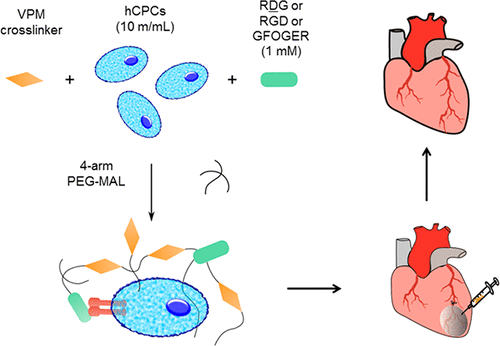当前位置:
X-MOL 学术
›
ACS Biomater. Sci. Eng.
›
论文详情
Our official English website, www.x-mol.net, welcomes your feedback! (Note: you will need to create a separate account there.)
Evaluation of Hydrogels Presenting Extracellular Matrix-Derived Adhesion Peptides and Encapsulating Cardiac Progenitor Cells for Cardiac Repair.
ACS Biomaterials Science & Engineering ( IF 5.8 ) Pub Date : 2017-11-17 , DOI: 10.1021/acsbiomaterials.7b00502 Srishti Bhutani 1 , Aline L Y Nachlas 1 , Milton E Brown 1 , Tionne Pete 1 , Christopher T Johnson 1, 2 , Andres J García 2, 3 , Michael E Davis 1, 2, 4, 5
ACS Biomaterials Science & Engineering ( IF 5.8 ) Pub Date : 2017-11-17 , DOI: 10.1021/acsbiomaterials.7b00502 Srishti Bhutani 1 , Aline L Y Nachlas 1 , Milton E Brown 1 , Tionne Pete 1 , Christopher T Johnson 1, 2 , Andres J García 2, 3 , Michael E Davis 1, 2, 4, 5
Affiliation

|
Cell therapy is an emerging paradigm for the treatment of heart disease. In spite of the exciting and promising preclinical results, the benefits of cell therapy for cardiac repair in patients have been modest at best. Biomaterials-based approaches may overcome the barriers of poor differentiation and retention of transplanted cells. In this study, we prepared and tested hydrogels presenting extracellular matrix (ECM)-derived adhesion peptides as delivery vehicles for c-kit+ cardiac progenitor cells (CPCs). We assessed their effects on cell behavior in vitro as well as cardiac repair in rats undergoing ischemia reperfusion. Hydrogels presenting the collagen-derived GFOGER peptide induced cardiomyocyte differentiation of CPCs as demonstrated by increased expression of cardiomyocyte structural proteins. However, conditioned media obtained from GFOGER hydrogels showed lower levels of secreted reparative factors. Interestingly, following injection in rats undergoing ischemia-reperfusion, treatment with CPCs encapsulated in nonadhesive RDG-presenting hydrogels resulted in the preservation of cardiac contractility and attenuation of postinfarct remodeling whereas the adhesion peptide-presenting hydrogels did not induce any functional improvement. Retention of cells was significantly higher when delivered with nonadhesive hydrogels compared to ECM-derived peptide gels. These data suggest that factors including cell differentiation state, paracrine factors and interaction with biomaterials influence the effectiveness of biomaterials-based cell therapy. A holistic consideration of these multiple variables should be included in cell-biomaterial combination therapy designs.
中文翻译:

呈现水凝胶的细胞外基质衍生的粘附肽和心脏修复的心脏祖细胞封装的水凝胶的评估。
细胞疗法是治疗心脏病的新兴范例。尽管有令人兴奋和令人鼓舞的临床前结果,但细胞疗法对患者心脏修复的好处充其量只是充裕的。基于生物材料的方法可以克服移植细胞分化和保留能力差的障碍。在这项研究中,我们准备并测试了呈现出细胞外基质(ECM)衍生的粘附肽作为c-kit +心脏祖细胞(CPC)传递载体的水凝胶。我们评估了它们对缺血再灌注大鼠体外细胞行为以及心脏修复的影响。呈现胶原蛋白衍生的GFOGER肽的水凝胶可诱导CPC的心肌细胞分化,如心肌细胞结构蛋白表达的增加所证明。然而,从GFOGER水凝胶获得的条件培养基显示出较低水平的分泌修复因子。有趣的是,在对大鼠进行缺血-再灌注注射后,用包裹在非粘性RDG呈递水凝胶中的CPCs处理可保留心脏收缩力并减轻梗死后重塑,而呈递肽的水凝胶不会引起任何功能改善。与ECM衍生的肽凝胶相比,非粘附性水凝胶递送时,细胞的保留率显着更高。这些数据表明,包括细胞分化状态,旁分泌因子和与生物材料的相互作用在内的因素会影响基于生物材料的细胞疗法的有效性。
更新日期:2017-12-04
中文翻译:

呈现水凝胶的细胞外基质衍生的粘附肽和心脏修复的心脏祖细胞封装的水凝胶的评估。
细胞疗法是治疗心脏病的新兴范例。尽管有令人兴奋和令人鼓舞的临床前结果,但细胞疗法对患者心脏修复的好处充其量只是充裕的。基于生物材料的方法可以克服移植细胞分化和保留能力差的障碍。在这项研究中,我们准备并测试了呈现出细胞外基质(ECM)衍生的粘附肽作为c-kit +心脏祖细胞(CPC)传递载体的水凝胶。我们评估了它们对缺血再灌注大鼠体外细胞行为以及心脏修复的影响。呈现胶原蛋白衍生的GFOGER肽的水凝胶可诱导CPC的心肌细胞分化,如心肌细胞结构蛋白表达的增加所证明。然而,从GFOGER水凝胶获得的条件培养基显示出较低水平的分泌修复因子。有趣的是,在对大鼠进行缺血-再灌注注射后,用包裹在非粘性RDG呈递水凝胶中的CPCs处理可保留心脏收缩力并减轻梗死后重塑,而呈递肽的水凝胶不会引起任何功能改善。与ECM衍生的肽凝胶相比,非粘附性水凝胶递送时,细胞的保留率显着更高。这些数据表明,包括细胞分化状态,旁分泌因子和与生物材料的相互作用在内的因素会影响基于生物材料的细胞疗法的有效性。


























 京公网安备 11010802027423号
京公网安备 11010802027423号